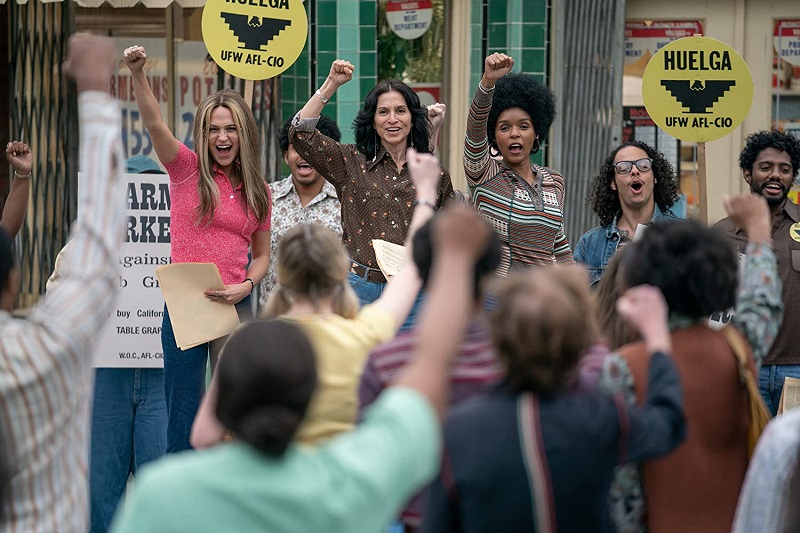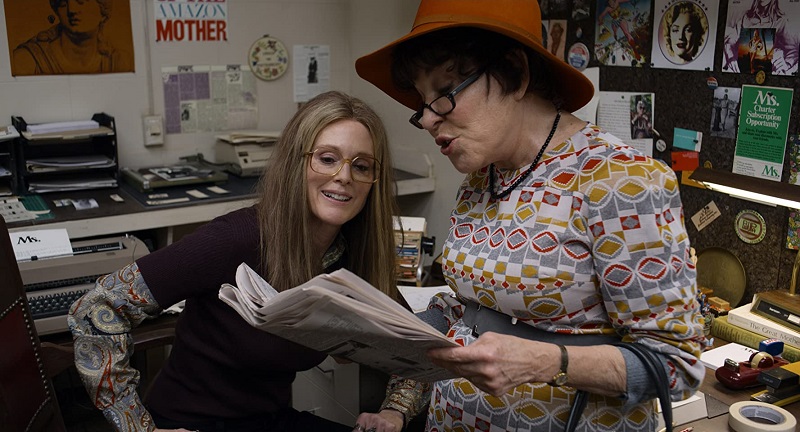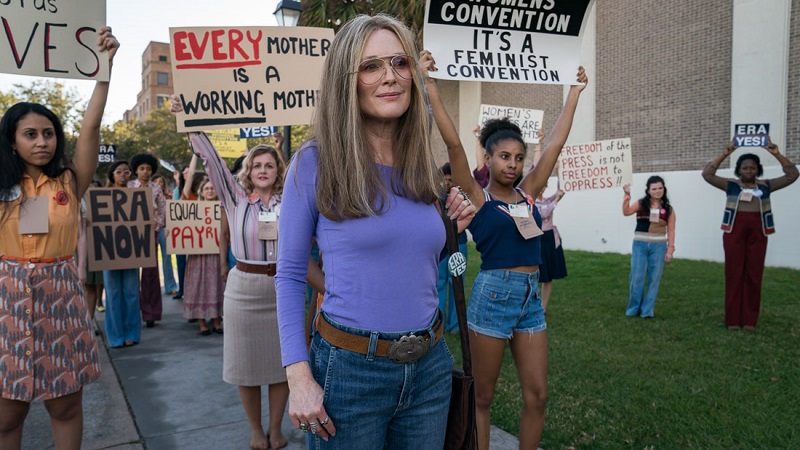Gloria Steinem has led a life so enormous; it took four actresses to bring her story to the screen in The Glorias. Two of them, Julianne Moore, and Alicia Vikander have won Oscars! The other two portray the feminist icon as a teenager and as a little girl. The film is stunning, a visual cornucopia of cultural history that finds one with a tsunami of emotions while witnessing its glory. Directed (and written) by Julie Taymor, it is the most contextualized portrait of an agent of change that can be achieved.

The film plays with its timeline in the most effective of ways, jumping between India (where Vikander is playing Steinem after college when she went to the country to study), her past growing up in Ohio, and on the road with her father—a place her pops says is the best place to get an education. Fitting then that the book that this film is based on is called Gloria Steinem: My Life on the Road. The autobiography provides the perfect structure for Taymor to work her cinematic magic.
Its zig-zag through her herstory is not linear but what it does achieve is show us where she was going in the framework of where she had been. A straightforward narrative would not have had the same effect as the one achieved with Taymor’s brilliant tome. From Sturgis, South Dakota to Londontown, as we travel with our subject, the viewer is treated to a menagerie of lives who are touched by the titular soul. If you’re getting the impression that the scope of The Glorias is massive, you would be correct. The best part of what Taymor has done is that traditionally when tackling this kind of decades-spanning spotlight on an important individual’s societal contribution, it can be too much for a coherent narrative. Sure, the film is a wee bit long, but it’s worth every single second.
All four actresses are mesmerizing and Vikander and Moore, especially, not only look like the legend but capture her speech and cadence impeccably. These are still very much three-dimensional characters and not just caricatures. Lulu Wilson (The Haunting of Hill House) is the young teenage Gloria, while Ryan Kiera Armstrong embodies the childhood Gloria. Sometimes, Taymor has all four riding on the same bus talking amongst themselves about life events that have occurred or are about to happen. It’s a fascinating use of dramatic power that will surprisingly have the viewer looking inward at their own personal decades-long journey. Each actress brings a unique take on the iconic woman and humanizes her better than a singular portrayal would have accomplished. It’s a bold choice, but it pays off.
The theme that this is a woman on the road never escapes. There is a forward motion that links the entire endeavor that is unstoppable—much like the movement that Steinem helped shape and launch into the stratosphere. There is something else quite unique about Th Glorias and that it is the rare biopic that you can re-watch and get something new every single time. There is so much to digest here, it truly cannot be broached with a single look. Each “life” informs the others, and uniquely, vice versa. This is a complete portrait, while still being vast in its scale. Commencing with Kiera’s Gloria as she and her father put on a dance at the end of a pier that not only is missing its headliner, but a downpour occurs and we’ve left with the powerful image of a father and his little girl dancing in the rain. Then, the film follows Steinem all the way to the recent Women’s March on Washington in 2017 when she delivered that pulsating, passionate speech to hundreds of thousands.
We get to know much about her mother and her father. Leo Steinem (Timothy Hutton) is a bit of a renegade who took to the road as her mother, Ruth Steinem (Enid Graham), stayed close to home. The latter gave up a career in journalism to raise a family and to follow her husband across the country as he sold everything that wasn’t nailed down. This chapter of Gloria’s life is especially insightful as it is easy to see how the pairing of those two crafted the woman who history keenly knows. All the actresses have priceless chemistry with Hutton’s Leo, but there is something truly touching about Vikander and Hutton’s scenes as he advises her, adult-to-adult, and it is he who encourages her travels, career aspirations, and other ventures when women of that time were few and far between pursuing any one of those aspirations. There’s one part of the film where Vikander and Hutton drive cross country to New York City, and it mirrors the trips they used to take when she was younger. It is such an absolute joy seeing these two. See, Gloria of this time is already established in terms of her personal mission, but there is a little girl still inside her who revels in her time with daddy on the road.

One thing has to be mentioned. This is a much different tale than Mrs. America. Sure, we see Phyliss Shockley on Television and those who wish to fight the ERA. But this is a story about Gloria Steinem and her life story, it’s not the women’s movement story that Mrs. America laid out. This is the story of Steinem, her road to that movement, and where the road took her since, including the Cherokee nation where she helped elect the tribe’s first female chief, Wilma Mankiller (Kimberly Guerrero). It is one of the more utterly moving moments of the film.
But this is a film that is filled with moments to remember. As Steinem finds her voice, so too does a cavalcade of women who stand up in ways they never had prior. The publishing of Ms. magazine, in particular, is shown how it had a vast and immediate effect on women of America (and to an extent, the world).

Moore commands but who is surprised? The Big Lebowski scene-stealer dazzles as she simultaneously drips with self-confidence yet is still riddled with a never-ending swath of questions about what she’s doing and if it’s enough. She also vexes over whether what she is doing is the right thing to be doing and most importantly, how she can best move the lives of women forward to a place they’ve never even dreamed of. This, in particular, is the charge of Moore’s take on the character. She has one eye on legacy, and another on the forward progress of her movement.
The Glorias is an all-star event and the ensemble is one that a person of her impact is worthy of. Bette Midler is dazzling as Bella Abzug, the legendary pol who worked alongside Steinem in the women’s movement. Her performance, in particular, illustrates why this story stands on its own-beyond Mrs. America. The stellar Margo Martindale embodied Abzug in that FX/Hulu film and both she and Midler bring her to life in such unique ways that both brilliantly salute her in individual and epic ways. Meanwhile, Flo Kennedy, as played by Lorraine Toussaint, is sublime in her role as the lawyer, feminist, civil rights advocate, lecturer, and activist who was a priceless force of nature alongside Steinem. Then, there’s that reality of family-work balance that gets a shining spotlight by Dorothy Pitman Hughes (Janelle Monáe), who was a huge part of the movement in the early days, but found it was difficult to do all she could for women with three kids and took a step back. The entire collective came together in the most loving and caring of ways as this film feels like a love letter to a life lived greatly.

Taymor has given us some indelible images over her years as a storyteller—from Frida to Across the Universe. All that experience pulsates through what is her most important film yet. The way she captures the essence of Steinem and translated that embodiment into a cultural history lesson for equal rights, right on down to the detractors, the helpers, and the heroes who moved mountains with her lighting the fuse. There’s one sequence that sticks long after the film is concluded and it finds Moore, as a more mature Steinem, running on an open road that is more treadmill than blacktop highway. She is jogging as fast as she can, but there is a look on her face that her pace isn’t enough. Ms. Steinem, it is enough, it has been more than enough and blissfully—you are far from finished.
Grade: A

